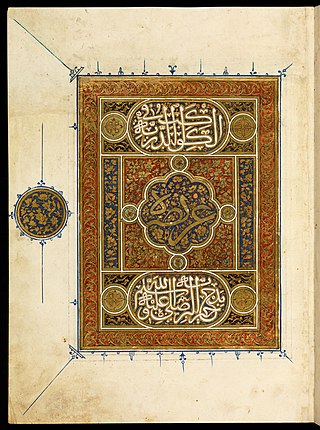21 Ramadan is the twenty-first day of the ninth month (Ramadan) of the Islamic calendar.

Mahdism in the Twelver branch of Shia Islam, derived from the belief in the reappearance of the Twelfth Shiite Imam, Muhammad al-Mahdi, as the savior of the apocalypse for the salvation of human beings and the establishment of peace and justice. Mahdism is a kind of messianism. From this perspective, it is believed that Jesus Christ and Khidr are still alive and will emerge with Muhammad al-Mahdi in order to fulfil their mission of bringing peace and justice to the world.

Qasīdat al-Burda, or al-Burda for short, is a thirteenth-century ode of praise for the Islamic prophet Muhammad composed by the eminent Sufi mystic Imam al-Busiri of Egypt. The poem whose actual title is al-Kawākib ad-durriyya fī Madḥ Khayr al-Bariyya, is famous mainly in the Sunni Muslim world. It is entirely in praise of Muhammad, who is said to have been praised ceaselessly by the afflicted poet, to the point that Muhammad appeared in a dream and wrapped him in a mantle or cloak; in the morning the poet discovers that God has cured him.
Abū Muḥammad al-Ḥusayn ibn Masʻūd ibn Muḥammad al-Farrā' al-Baghawī, born 1041 or 1044 died 1122 was a renowned Persian Muslim mufassir, hadith scholar, and Shafi‘i faqih, best known for his major work Maʻālim at-Tanzīl. Al-Farra' is a reference to trading with fur, and al-Baghawī is a reference to his hometown Bagh or Baghshûr between Herat (Afghanistan) and Marw al-Rudh. He died in Marw al-Rudh.
Ahmed Harrak Srifi was a prominent Moroccan scholar from the tribe of Ahl Srif in the north of Morocco.

Nizam al-Din Hasan al-Nisaburi, whose full name was Nizam al-Din Hasan ibn Mohammad ibn Hossein Qumi Nishapuri was a Persian Sunni Islamic Shafi'i, Ash'ari scholar, mathematician, astronomer, jurist, Qur'an exegete, and poet.
23 Ramadan is the twenty-third day of the ninth month (Ramadan) of the Islamic calendar.
Najm ad-Dīn Abū Ḥafṣ 'Umar ibn Muḥammad an-Nasafī was a Muslim jurist, theologian, mufassir, muhaddith and historian. A Persian scholar born in present-day Uzbekistan, he wrote mostly in Arabic.

Al-Bahr al-Madeed fi Tafsir al-Qur'an al-Majeed or shortly named al-Baḥr al-Madīd, better known as Tafsir Ibn 'Ajiba, is a Sunni Sufi tafsir work, authored by the Maliki-Ash'ari scholar Ahmad ibn 'Ajiba, who was following the Shadhili-Darqawi order.

Al-Muharrar al-Wajiz fi Tafsir al-Kitāb al-'Aziz or shortly named al-Muharrar al-Wajiz, better known as Tafsir Ibn 'Atiyya, is a classical Sunni tafsir of the Qur'an, authored by the Maliki-Ash'ari scholar Ibn 'Atiyya.
Zakaria ibn Idris Ash'ari Qomi or Zakaria ibn Idris ibn Abd-Allah al-Ash'ari al-Qomi, known as Abu Jarir, was a Shia Muhaddith and one of the companions of Jaʿfar ibn Muḥammad aṣ-Ṣādiq, Musa ibn Ja'far al-Kadhim, and Ali ibn Musa al-Ridha. A group of Shiite elders have considered him one of the influential people in the growth of Islam. Shaykh Tusi, while counting about 3300 narrators and companions of Jaʿfar ibn Muḥammad aṣ-Ṣādiq, has mentioned Zakaria al-Ash'ari.

Zakaria ibn Adam Ash'ari Qomi was a Shia Muhaddith from 8th century and one of the companions of Jaʿfar ibn Muḥammad aṣ-Ṣādiq. He was one of the narrators of Musa ibn Ja'far al-Kadhim and the agent of Ali ibn Musa al-Ridha and Muhammad al-Jawad in Qom, Iran.
Mohammad ibn Masoud Ayyashi or Mohammad ibn Masoud Ayyashi Samarqandi, known as Ayyashi, was an eminent Shia Islam scholar. He had many works in the field of exegesis of the Quran, Islamic jurisprudence, Arabic literature and hadith. His exegesis of the Quran, known as Tafsir Ayyashi, is his most famous book.

The Isfahan Seminary is one of the oldest seminaries in Isfahan, Iran. Currently, more than 40 schools in Isfahan province are under the supervision of the Management Center of Isfahan Seminary and the leadership of the supreme authority of Grand Ayatollah Hossein Mazaheri.
13 Rajab is the thirteenth day of the seven month (Rajab) of the Islamic calendar.

Zahabiya Sufism is a Shiite order. The history of dervishes from this order dates to the third century AH and Ma'ruf al-Karkhi. Some believe that the order originated during the ninth century AH in Iran; it first became popular in Khorasan and then in Shiraz during the early Safavid period.
19 Ramadan is the nineteenth day of the ninth month (Ramadan) of the Islamic calendar.

Ehya or Vigil night is one of the most important traditions among Shia Muslims. According to most commentators, vigil for the purpose of night prayer, as it appears from Surah Al-Muzzammil of the Quran was obligatory for about a year at the beginning of Islam, and Muslims performed it alongside the Islamic prophet Muhammad. According to most Islamic jurists and commentators, after about a year, according to verse 21 of the same surah, God reduced this ruling and replaced it with tahajjud. Muslims observe Ehya or Vigil night on the nineteenth, twenty-first and twenty-third nights of the Islamic month of Ramadan.
Aḥmad ibn ʿĪsā ibn Zayd Islamic theologian, Hadith scholar and Faqih, was the grandson of Zayd ibn Ali, one of the famous Alids of the early Abbasid Caliphate and one of the famous Zaydiyyah scholars who lived most of his life on the run. His kunya was Abū ʿAbd Allāh and his nickname was Al-Mukhtafī. Ahmad ibn Isa ibn Zayd 's sixty years of secret life is proof of the nickname given to him.
Noureddin Esheni Qudejani or Noureddin Qudejani Esheni was an Iranian Shia cleric, famous preacher and orator of Isfahan, Faqih, lawyer and professor of Isfahan Seminary. He was the famous Salah al jama'ah imam of the Seyyed Mosque of Isfahan. He was one of the modernist clerics and the first cleric to study law and become a lawyer.









